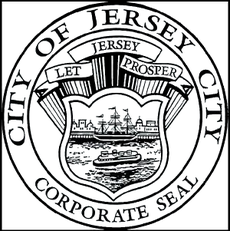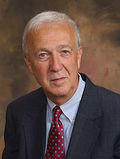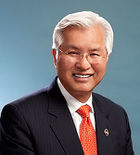Jersey City, New Jersey, Election Date Change Measure (November 2016)
| Public Question #1: Jersey City Election Date Change |
|---|

|
| The basics |
| Election date: |
| November 8, 2016 |
| Status: |
| Topic: |
| Local election and voting laws |
| Related articles |
| Local election and voting laws on the ballot November 8, 2016 ballot measures in New Jersey Hudson County, New Jersey ballot measures |
| See also |
| Jersey City, New Jersey |
A charter amendment to change the city election date from the second Tuesday in May to the November general election was on the ballot for Jersey City voters in Hudson County, New Jersey, on November 8, 2016. It was approved.
| A "yes" vote amended the city charter to shift municipal elections from the second Tuesday of May to the general election in November. |
| A "no" vote would have left the charter unchanged so that municipal elections would continue to be held in May. |
The charter amendment, which was approved in the city council as Ordinance 15.175, could not be rescinded for 10 years.[1]
Election results
| Jersey City Public Question 1 | ||||
|---|---|---|---|---|
| Result | Votes | Percentage | ||
| 16,882 | 57.95% | |||
| No | 12,249 | 42.05% | ||
- Election results from New Jersey On-line
Text of measure
Ballot question
The following question appeared on the ballot:[2]
| “ |
Should the Charter of the City of Jersey City; governed by Mayor-Council Form C, be amended as permitted under that plan, to provide for the holding of its regular municipal elections on the same date of the general election in November, pursuant to N.J.S.A.40:69A-34.1(b)?[3] |
” |
Support
Supporters
Mayor Steven Fulop had advocated for the move since 2010, when state legislation first allowed the date change.[1][4][5]
Arguments in favor
Mayor Fulop and other supporters of the measure argued that holding the city election in November rather than May could save the city up to $400,000 per year and improve voter turnout.[5]
Opposition
Opponents
Bill Matsikoudis, former city attorney under Fulop's predecessor Jerramiah Healy, opposed this measure and publicly critiqued Fulop's support in an opinion piece for NJ.com.[6]
Former mayors Jerramiah Healy and Bret Schundler also opposed the proposal.[7]
Arguments against
Matsikoudis argued, "Voters should VOTE NO on this referendum because it will dilute the traditional focus on local issues that a separate May election permits, create a confusing ballot and enable Mayor Fulop to treat Jersey City as his back-up plan, so that he could still run for mayor in November if he loses the Democratic Primary for governor in June."[6]
In a joint statement, Healy and Shundler argued that combining the city's elections with other races for state and school board elections would "create a confusing ballot." They also pointed out that if a runoff election were necessary after a November election, it could not be held until December. Healy said, "We are concerned that an election during the holiday season will lead to a sharp drop in voter turnout."[7]
Reports and analysis
The Jersey Journal - Other cities
About 24 out of the 80 cities with nonpartisan elections in New Jersey decided to move their municipal elections from May to November after state legislation was approved in 2010 allowing this change. Of the cities that altered their election schedules, the following had populations over 40,000: Hoboken, Jackson Township, Manchester, Perth Amboy and Vineland. The Jersey Journal published a report on turnout in mayoral elections in these cities comparing elections before and after the change.
The report showed an increased turnout percentage in four of the five cities:
- Perth Amboy's November 2012 mayoral election had a turnout of 51 percent, while the turnout for the May 2008 election was 35 percent.
- Vineland's 2012 mayoral election featured a turnout of 54 percent, compared to 26 percent at the May 2008 election.
- Manchester's November 2014 mayoral election had a turnout of 54 percent; the turnout for the city's May 2008 election was 39 percent.
- In Jackson, 34 percent of registered voters came out to vote in November 2014, compared to a turnout of 22 percent in May 2010.
In Hoboken, the 2013 mayoral race featured a turnout of 45 percent in November 2013, which was down from a 65 percent turnout in May 2009. There were 2,000 more ballots cast in November 2013, however. The smaller voter turnout percentage is because of a 70 percent increase in registered voters between 2009 and 2013.[8]
Matthew Hale, Seton Hall University - effect on Republican turnout
Matthew Hale, a political science professor at Seton Hall University, said that moving the election date could have a larger effect on the Republican turnout than for any other party. As of late 2015, Republicans formed a small minority of registered voters in Jersey City. Considering that there were about 7,000 registered Republicans, around 58,000 registered Democrats and about 55,000 independents, Hale stated, "In a May election, if you're a partisan Republican, you might just give up. You might say, 'What's the point?' But in a November election, where there might be a competitive race elsewhere, Jersey City Republicans are more likely to turn out in November."[8]
Background
| Voting on elections and campaigns | ||||
|---|---|---|---|---|

| ||||
| Ballot measures | ||||
| By state | ||||
| By year | ||||
| Not on ballot | ||||
|
2015 non-binding referendum
To gauge public reception to the change, the city council placed a nonbinding referendum question about the matter on the November 2015 ballot. Eight percent of the city's registered voters cast ballots on the matter and demonstrated a slight preference for the change; 4,702 voted in favor of the date change, and 4,437 voted against it.[1][4][5]
Fulop re-election issue
Mayor Fulop faced some criticism for advocating for the change as he considers a gubernatorial campaign in 2017. If the city moves its election dates and Fulop were to run and lose the gubernatorial primary election in June 2017, he would still have time to run for re-election as mayor. Councilman Michael Yun criticized Fulop for backing the proposed charter amendment and said Fulop was motivated by personal interests. Referring to Fulop, Yun said, "The system should not be changed for just one person."[5]
The mayor emphasized his long-running support for the election change, which he first voiced in 2010 as the Ward E city councilman. When the state law allowing this change was approved in 2010, Fulop said, “This will not only save Jersey City significant cash, but it makes sense. It is challenging to get the people to come out for each election, when they are held at incongruent times. We should move the elections to the people. I have been watching this legislation for the past year and believe it could fundamentally change how cities like mine are run. This is crucial for Jersey City to reach beyond the political machine to have a more representative election.”[9]
City spokeswoman Jennifer Morrill argued that Fulop was not motivated by the effects the election date change could have on his career. She said, "Long before there was ever talk of any governors [sic] race, the mayor has been on the record as supporting this. Critics will spin this for their own personal reasons but the reality is this saves money and encourages voter participation."[1][4][5]
Path to the ballot
On January 13, 2016, the Jersey City City Council voted 7-2 to put this measure before voters at the election on November 8, 2016. Councilmen Rich Boggiano and Michael Yun voted "no."[4]
2010 state bill authorizing election change
The city's authority for this charter amendment was granted through New Jersey Statutes Annotated section 40:69A-25.1, which is part of what is called the Faulkner Act. The Faulkner Act, which was also called the Optional Municipal Charter Law, was amended in 2010 by Assembly Bill 351 to allow cities to change their election dates to coincide with the general election in November while keeping the same form of government and nonpartisan elections. This bill also dictated the form of the ballot question to be used to present the change to voters.
![]() See law: Optional Municipal Charter Law 40:69A-25.1
See law: Optional Municipal Charter Law 40:69A-25.1
Assemblyman Patrick Diegnan Jr. (D-18), who was the primary sponsor of AB 351, said, “Allowing towns that hold May nonpartisan elections to move those elections to November without jeopardizing their nonpartisan status is a win for everyone. Municipalities win because they save money while being able to keep their unique form of government; voters and candidates win because the electorate is more engaged and more active in November elections.”[9]
Recent news
The link below is to the most recent stories in a Google news search for the terms Jersey City election date change measure. These results are automatically generated from Google. Ballotpedia does not curate or endorse these articles.
See also
Related measures
![]() Measure 1: City of Los Angeles New City Election Dates and Schedules Charter Amendment
Measure 1: City of Los Angeles New City Election Dates and Schedules Charter Amendment
![]() Measure 2: City of Los Angeles LA Unified School District Election Date Alignment Charter Amendment
Measure 2: City of Los Angeles LA Unified School District Election Date Alignment Charter Amendment
External links
Footnotes
- ↑ 1.0 1.1 1.2 1.3 NJ.com, "In tight voting over timing of Jersey City elections, Fulop claims victory," November 3, 2015
- ↑ Jersey City Government, "Ordinance 15.175," accessed February 8, 2016
- ↑ Note: This text is quoted verbatim from the original source. Any inconsistencies are attributable to the original source.
- ↑ 4.0 4.1 4.2 4.3 NJ.com, "Fulop hoping voters opt to move Jersey City's election day," October 26, 2015
- ↑ 5.0 5.1 5.2 5.3 5.4 NJ.com, "Plan to move Jersey City elections to November clears hurdle," January 13, 2016
- ↑ 6.0 6.1 NJ.com, "Vote 'no' on changing Jersey City election day | Opinion," October 7, 2015
- ↑ 7.0 7.1 NJ.com, "Two ex-Jersey City mayors oppose moving elections to November," October 23, 2015
- ↑ 8.0 8.1 NJ.com, "As Jersey City debates election timing, arguments turn to turnout," November 17, 2015
- ↑ 9.0 9.1 Jersey City Independent, "Will Jersey City Make the Move to November Elections?" January 8, 2010
| ||||||||









